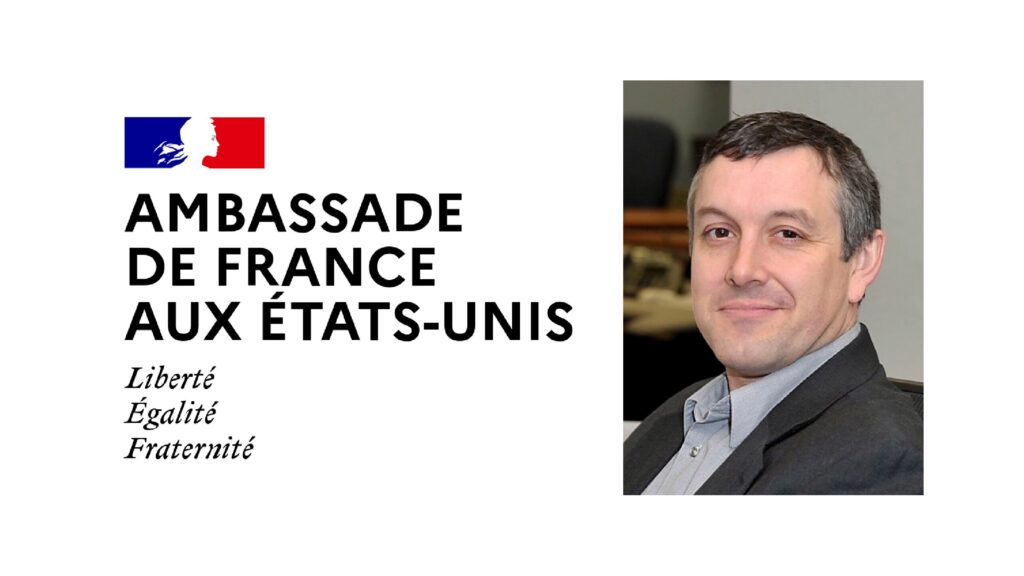Woodard Speaks at French Embassy In Washington
WASHINGTON – The director of Pell Center’s new Nationhood Lab project addressed the annual meeting of France’s consul generals and honorary consul generals to the United States at the Embassy of France on January 20, 2023.
At the invitation of French Ambassador Phillipe Etienne, Colin Woodard shared his analysis of how the United States had found in danger of democratic collapse, the structural weaknesses the federation inherited from the colonial era, and how the project he leads at Salve Regina University is working to bolster the country’s liberal democratic experiment.
“We’re developing and testing an updated version of our civic national narrative – the story of why America exists, why it should continue to exist, about who belongs and where we are going,” Woodard, a Polk Award winning journalist and New York Times bestselling historian, told the gathering. “It’s a story tied to the values in the Declaration of Independence – a people committed to the natural equality and freedom of all humans and the representational self-government that makes that possible.”
Woodard, author of six books including “American Nations: A History of the Eleven Rival Regional Cultures of North America” and “Union: The Struggle to Forge the Story of United States Nationhood”, warned the U.S. remains vulnerable in the aftermath of the Jan. 6, 2021 attack on the U.S. Capitol, which he said came perilously close to ending American democracy.
“The U.S. still stands at a crisis point, the future of both the republic and the federation uncertain,” he said. “I think we will survive this crisis – those committed to America’s democratic ideals do in fact outnumber those seeking to overthrow them – but given the stakes, I’m not nearly as certain about that as I would like to be.”
He noted the United States is really a federation of regional cultures, most of which have their origins in one of the rival 17th and 18th-century colonial projects, from the Puritans in New England and the Dutch settled area around what is now New York City to the Chesapeake Tidewater country and the Spanish settled southwest. This accounts for the enormous and persistent political and ideological differences between these sections throughout our history as a single political entity. It also makes having a credible national story critically important to the country’s stability, he told the diplomats, who had gathered in Washington from postings spread across the country.
Woodard also described how the U.S. civic national story has always faced a rival ethnonational one, in its original form that the United States was supposedly the homeland of the “Anglo-Saxon race.” The fight between those rival visions of the country’s purpose is a major throughline of U.S. history, including the Civil War, the collapse of Reconstruction, the Jim Crow era, the Civil Rights era, and the storming of the Capitol on Jan. 6th.
“Our history is the story of the struggle between those two stories, the struggle for our nation’s soul,” he said.
Woodard, who was a visiting senior fellow at the Pell Center in 2022, is a longtime foreign correspondent who reported from more than fifty foreign countries and seven continents, including four years in Eastern Europe and the Balkans during that region’s difficult transition from totalitarian rule. As state and national affairs writer at the Portland Press Herald he received a George Polk Award and was a finalist for a Pulitzer Prize. A graduate of Tufts University and the University of Chicago he is a past Pew Fellow in International journalism at the Johns Hopkins University School for Advanced International Study.
Nationhood Lab, which launched with the new year, will deliver more effective tools with which to describe and defend the American liberal democratic tradition and better understand the forces undermining it. The project, whose website will launch later this month will have several elements: a data journalism website where Woodard and other authors reflect on the divisions in American society and what might be done to bind them; a narrative project to develop a new story of American civic nationalism; and an engagement agenda where that story is shared and spread across the United States to help address the divisiveness that plagues so much of American public life.
France has ten consulates across the United States plus dozens of honorary consuls who relay the embassy’s messages and help assist French citizens in their locality. They meet annually at the embassy in Washington. In 2018, 2019 and 2022, with the support of the Carnegie Corporation of New York, the Pell Center hosted the Rochambeau Dialogue, a set of high-level meetings to strengthen defense cooperation between France and the United States.

